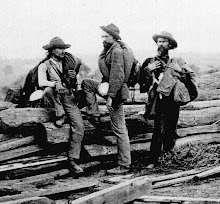
And now, a swallowtail pennant carried 134 years ago by Custer's 7th Cavalry on that final foray into present-day Montana - and found under the body of a vanquished trooper days after the battle - comes to the auction block, and the collecting community holds its collective breath to see what it will bring.
Sold by the trooper who found it to the Detroit Institute for the Arts for $54 in 1895, the guidon has stayed in Detroit all its modern life - except for occasional exhibitions, most recently at the Little Bighorn Battlefield National Monument in Montana.
Ragged and bloodstained, the pennant was discovered by Sgt. Ferdinand Culbertson, a member of the detail dispatched to the Bighorn - or Greasy Grass Creek as the victorious Lakota Sioux and Cheyenne referred to it - under the body of an unidentified soldier.
Another flag from the battle site was found months later in an Indian village seized by U.S. troops and is now owned by the National Park Service, but auctioneer Sotheby's - who will put the Culbertson guidon on the block in October - said it is in very poor condition.
The Detroit Institute for the Arts has decided to part with it and use the proceeds for future art acquisitions.
John Doerner, chief historian at the Little Bighorn Battlefield National Monument, said he believes the flag is stained with the blood of a fallen soldier and that the banner belongs to the American people.
"It was an act of courage and bravery," said Doerner, a 20-year veteran of the National Parks Service.
"To lose the colors was really something that a soldier would give their lives (to prevent)," he said.
Sotheby's says expectations are that the Custer flag sale price might exceed Sotheby's $2 million to $5 million estimate, but the hope is that the sale will come close to the $12.3 million paid for a Revolutionary Battle flag in 2006, a record for any military relic at auction.






